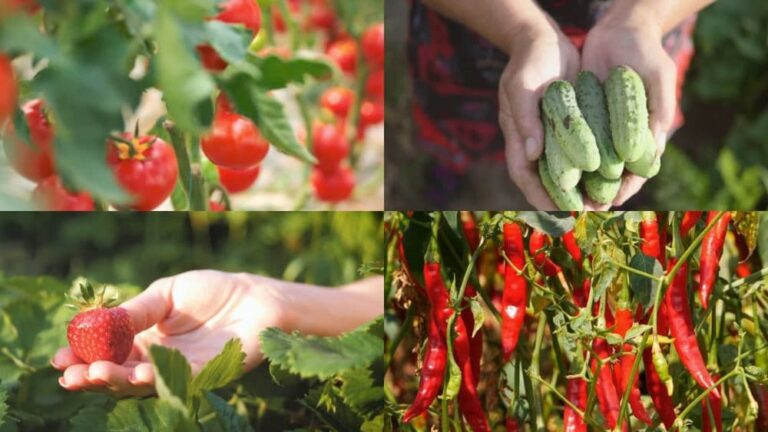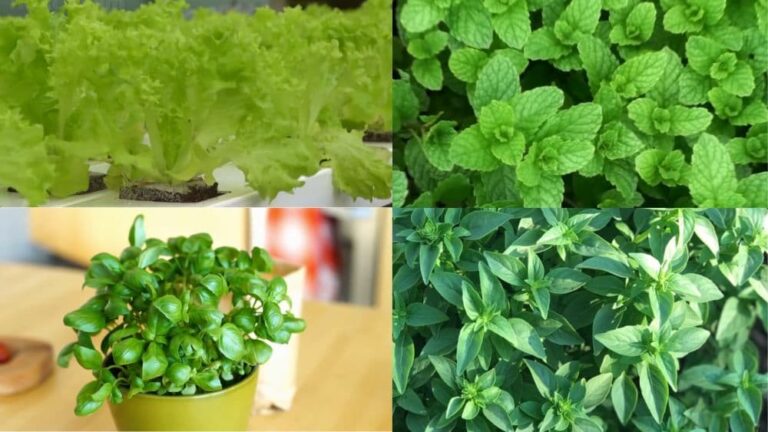Top 10 Most Profitable Hydroponic Crops to Grow Today
In recent years, hydroponics has become very popular in the U.S. There is a growing interest in urban gardening, and people are discovering how to invest in hydroponics as a business and as a hobby. Crop selection is crucial. Let’s look at the most profitable hydroponic crops and find out what makes them stand out in modern farming.

Knowing how profitable hydroponic plants can be
Making the most profit from hydroponic plants requires considering several factors:
Growth Rate: Hydroponics optimizes nutrient delivery and controls environmental conditions, so plants often grow faster than in soil. More harvests in the same period are possible with a faster process.
Market Demand: Americans increasingly prefer food that is locally grown and fresh. People are willing to pay more for crops grown without pesticides and benefiting the environment.
Running costs: Think about nutrient solutions, electricity, and equipment upkeep. Profits can increase if running costs drop.
Hydroponic farming produces more crops in less time. With the right setting and choice of plants, hydroponic growers can get the most out of their money.
Basil is the most popular herb.
Basil is the most profitable hydroponic crop for many reasons.
Basil grows really well in hydroponic setups. With the right mix of nutrients and light, it can be ready in 4 to 6 weeks.
Market Demand: Basil is in high demand in the U.S. market. Basil is a favorite in Italian cuisine, including pestos, salads, and fresh pesto.
Growers can sell more than just fresh basil by making added-value products. Think about oils with basil in them, dried basil, and even pesto. These can bring in more money than green leaves.
Lettuce is a hydroponic favorite.
Lettuce, which comes in many types, like romaine and butterhead, is a must-have in hydroponic systems.
Quick Growth: Lettuce is one of the fastest-growing crops. It can be picked in three weeks, so you can grow it more than once a year.
Demand All Year: Lettuce is used in many American dishes, like salads, sandwiches, and wraps. Since people always want it, sales are expected to remain steady.
For the most effective growth, keep the pH level of your hydroponic solution between 5.5 and 6.5. Lettuce likes cooler temperatures, so make sure your system doesn’t get too hot.
Strawberries: A Profitable Investment That Pays Off in Juice
Some people might be surprised to see strawberries on the list, but it’s imperative to discuss how profitable they are.
Strawberry prices can be high when not in season. You can grow strawberries hydroponically all year, so you’ll always have some when strawberries are scarce.
Consumers prefer hydroponically grown strawberries because they are usually the same size and taste every time. They are also free of diseases or pests caused by dirt, making them a cleaner option.
Strawberry plants need a well-balanced nutrient solution and light to grow. Make sure you have the right equipment to meet their needs.
Hydroponics can lead to money-making opportunities. The key is to understand each crop’s market demand and adjust your hydroponic system properly. As we walk through this list, you’ll learn about more plants that can help your hydroponic business succeed.
The Numbers Behind Cucumbers
Hydroponic gardening has given cucumber farming a new lease on life. As well as tasting delicious in salads and pickles, these crunchy vegetables are also profitable to grow hydroponically. Hydroponically grown cucumbers grow faster and are healthier than those grown in soil.
The biggest benefit of growing cucumbers without dirt is that they are less likely to get diseases from the soil. Farmers can save money on pesticides with fewer diseases.
Hydroponically grown cucumbers are sold by highlighting their freshness, crunchiness, and naturalness. These cucumbers are an excellent addition to the list of the most profitable hydroponic plants since people in the U.S. are willing to pay more for non-GMO, pesticide-free foods.
Tomatoes: Ready to Make Money
Since tomatoes are a common food in homes, they are an ideal choice for hydroponic growing. These tomatoes often have better flavors, brighter colors, and longer shelf life than tomatoes grown in dirt.
Hydroponic tomato growing has another benefit. That makes it possible to grow tomatoes all year. Money always comes in when supply meets demand.
The market works so that organic and hydroponic tomatoes sell for more. Hydroponic tomatoes are becoming more popular in local markets and grocery shops because of the increased demand for clean, sustainable food.
Spinach is green gold.
Spinach is popular with Americans who are concerned about their health because it contains a lot of healthy nutrients. Growing spinach hydroponically has two benefits: the plants grow quickly, and turnover is high.
Hydroponic systems can produce spinach in as little as 4 to 6 weeks. Because this plant grows quickly, it can be harvested more than once a year, which makes it more profitable.
Since smoothie bowls, salads, and green drinks have become more popular, spinach demand has grown for a while. Hydroponically grown spinach is gaining popularity in farmers’ markets across the U.S., where its lush leaves and consistent quality make it one of the most profitable crops.
Peppers: An Investment with a Kick
From sweet bell peppers to hot chili peppers, peppers are useful and popular crops. In hydroponic systems, peppers get the right amount of nutrients, giving them brighter colors, the same size, and better taste.
Different kinds meet different markets’ needs. For example, bell peppers are a common ingredient in salads and other dishes, while hot peppers might appeal to a small group of people who like spicy foods.
ROI Potential:
Peppers are popular in many dishes, so there is considerable market demand for them. The controlled hydroponic climate guarantees a steady crop of high-quality peppers, giving growers a high return on their investment.

The Mint: A Refreshing Source of Income
With its fresh smell and wide range of uses, mint is quickly becoming a star in hydroponics. The herb is fairly easy to grow, doesn’t need much care, and grows quickly in hydroponic systems.
Mint adds flavor to drinks, garnishes, and essential oils. It means that there will always be a market for it, making it an excellent choice for a hydroponics business.
Market Potential: Herbal teas and natural treatments are becoming more popular in the U.S., and mint is leading the way. By pointing out that hydroponically grown mint is organic and doesn’t use pesticides, it can get a higher price. In this way, it will maintain its reputation as a very profitable hydroponic plant.
These veggies offer high returns because they are grown hydroponically. From cucumbers to mint, each has its own special selling points that attracts different types of customers. As the U.S. moves toward eating more sustainably and healthily, produce grown in hydroponic systems is likely to get a big share of the market. Investing in this “green gold rush” is a smart move right now.
Chives: The Profit Maker Nobody Thinks About
Chives are one of the most profitable hydroponic plants, even though they are often forgotten. These thin, green herbs are popular in cooking because they have a mild onion flavor that makes any dish taste better without taking over.
Hydroponically grown chives do well in controlled settings, which makes them an ideal choice for growing all year. Since they grow quickly, farms can harvest them more than once each year. This high change rate can help make more money.
Also, chives need less room than many other crops, which makes it possible to plant them close together. That means more money per square foot, resulting in a higher return on investment.
From a business point of view, fresh herbs are always popular. As gourmet and healthy cooking has become more popular in the U.S., chives have entered many homes. Plus, chives grown in hydroponic systems tend to be brighter in color and have stronger flavors, making them a favorite of cooks and food lovers alike.
Blueberries: The Best Investment in the World
Blueberries might not be the first crop that comes to mind when thinking of hydroponics. But when grown correctly, these juicy, sour berries are one of the most valuable hydroponic crops.
Blueberries usually need acidic soil and certain weather conditions, which traditional farms cannot provide in many areas. On the other hand, hydroponics is the most effective way to grow plants. Growers can make high-quality blueberries all year by controlling the pH level of the nutrient solution and maintaining the right conditions for growth.
Blueberries are popular in the U.S. They are a staple in smoothies, desserts, and health foods because they are full of antioxidants and tasty.
Also, fresh blueberries that aren’t in season can sell for a higher price, which increases profits a lot.
Another benefit is that organic food is more popular. Blueberries grown hydroponically in a controlled setting can reduce or even remove pesticides, appealing to the organic market segment.
Final Thoughts about Most Profitable Hydroponic Crops
Growers can find a lot to do in hydroponics, especially if they know where to look. As we looked at the most profitable hydroponic crops, we found that you can choose from herbs like basil to tasty fruits like blueberries. These crops will make you money and taste delicious.
The thing that all of these profitable hydroponic plants have in common is that they meet a market need and take advantage of hydroponic cultivation benefits. These benefits include growing plants year-round, using fewer resources, or getting organic certification.
If you live in the U.S. and are thinking about hydroponics, the message is clear: know the market, choose the right foods, and use hydroponic power. Financially and fun-wise, the benefits can be very positive.
FAQs:
Can I grow more than one plant at the same time in a hydroponic system?
Yes, for sure! Many growers grow different kinds of plants together to make the most of their room and get a wider range of crops. In that case, keep the nutrients and pH levels the same for all plants.
How do I determine which hydroponic plants will profit most in my area?
Do a market study. Find out what people in your area want, who your rivals are, and how much fresh produce costs. In an ideal world, crops that sell for more money and grow faster are more valuable.
Do foods grown in water taste different from soil crops?
Because nutrients are delivered in controlled amounts, hydroponically grown foods often have stronger flavors. But the taste can change based on the type and how it was grown.
Are hydroponic systems costly to set up?
It is more expensive to set up than traditional earth farming; however, higher yields, faster growth cycles, and year-round cultivation are often worth it.
Should I get a license to cultivate the most profitable hydroponic crops?
You can make more money with an organic license since organic food is in high demand. Make sure your growth methods meet certification standards.

Meet Milan Cole, your urban gardening pro!
Milan Cole, chief content writer at Maven Gardening and an urban gardening expert, is passionate about helping city dwellers cultivate their green thumbs. Armed with extensive horticultural knowledge, Milan provides practical advice for overcoming urban gardens’ challenges, like limited space, water scarcity, and reduced sunlight.
His expertise extends beyond traditional methods, encompassing innovative approaches like hydroponic and aquaponic systems and sustainable gardening practices. Milan skillfully adapts these techniques to urban environments, considering factors like pollution and climate change.
In his clear and concise writing, Milan offers actionable solutions for anyone wanting to bring life to an urban space. He shares valuable insights into growing herbs in tight spaces, maximizing the potential of window boxes, and transforming even the most miniature balconies into thriving green oases.
Milan’s guidance is straightforward and practical, making it ideal for anyone looking to cultivate their own urban garden, regardless of prior experience.
Join Milan Cole on your journey to metropolitan Eden!
